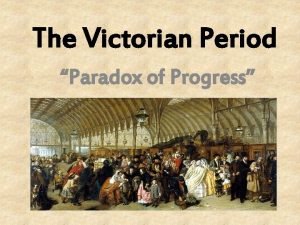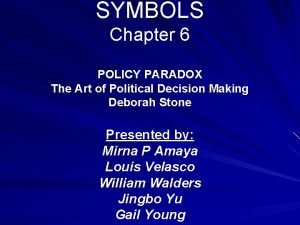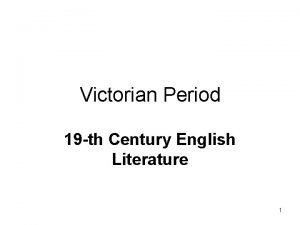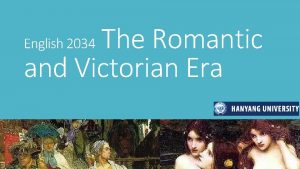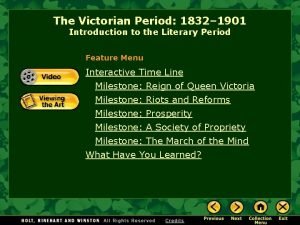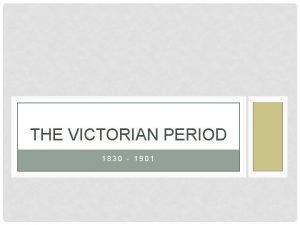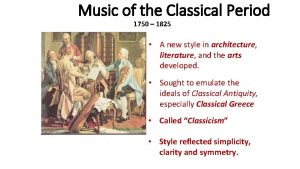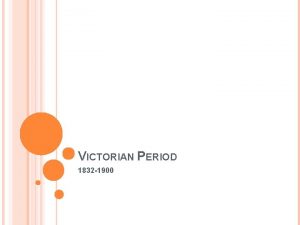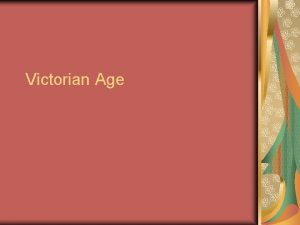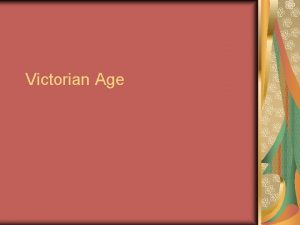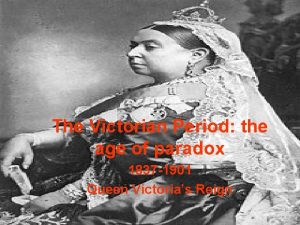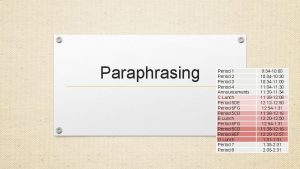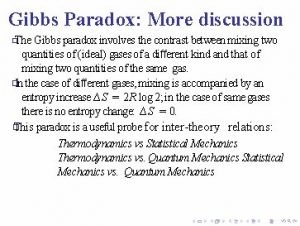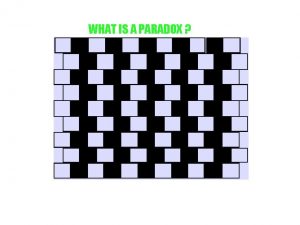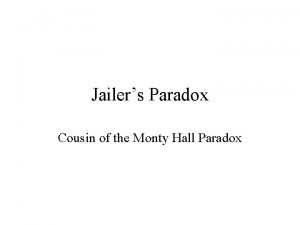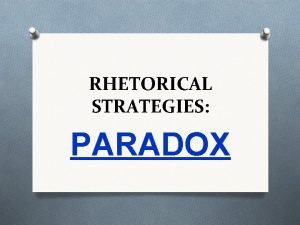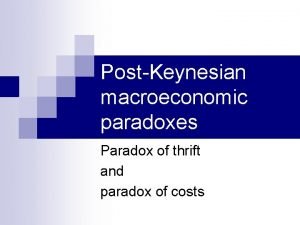The Victorian Period Paradox of Progress The Victorian
























- Slides: 24

The Victorian Period “Paradox of Progress”

The Victorian Period • Victorians thought of themselves living in a time of great change. – Growth – Prosperity – Progress

Peace and Economic Growth: Britannia Rules • Empire grew steadily until 1900 – India – North America • Queen Victoria was the ruler of more than 200 million people OUTSIDE Great Britain living of

Economic Growth • Industrial Revolution expanded – New towns, new goods, new wealth, and new jobs for people maneuvering through levels of the middle class. – Middle class and working class politicians and voters achieved political power while leaving the monarchy and aristocracy in place.

The Idea Progress • Thomas Babington Macauley voiced middle class Victorian attitude – History = progress • Progress= material improvement that could be seen and touched, counted and measured • Cleanliness and order • Victorians have confidence that all social and material problems can be solved by “progress. ” – By the end of the era, disruption and materialism led to a reevaluation of these values.

The Hungry Forties • 1 st decade of Queen Victoria’s reign was troubled – She came to the throne in the first year of a depression – 1. 5 million unemployed workers (out of 16 million people)were on some form of relief

The Hungry Forties • Poor working conditions – Government commissions investigated poor working conditions • Children were mangled at machines when they fell asleep at the end of 12 -hour work days. • Children hauled coal in the mines

The Hungry Forties • Potato Famine – Ireland (1845 -1849) – potato blight caused famine that killed a million and forced 2 million to emigrate. – Some went to England – caused severe overcrowding in cities

The Hungry Forties • Pollution and Filth – Rapid growth of the cities • Filthy and disorderly • Major cities were expanding because of industry – Streets were unpaved; Thames River was polluted with sewage, industrial waste, and drainage from graveyards – Bodies were buried six or eight deep

The Movement for Reform: Food, Factories, and Optimism • Violence and massive political rallies (1840) - To protest government policies that kept the price of food high and deprived most working men of the vote and representation in Parliament • Political reformers organized a “monster rally” to protest

Movements of Reform • Improvements in Diet – Mid-century – Price of food dropped because of increased trade with other countries and the growing empire • Diet improved – meat, fruit, and margarine (Victorian invention) was available to working-class households – Factories and railroads made items and services cheap

Movements of Reform • Florence Nightingale – Transformed public’s perception of modern nursing – Reformed hospital management • Octavia Hill – became authority on housing reform – Believed that adequate housing could “make individual life noble, homes happy, and family life good. ”

Movements in Reform • Reform Bills – Almost all adult males got to vote by the last decades of the century • First Reform Act – All men who owned property worth 10 pounds or more in yearly rent could vote • Second Reform Act – Right to vote to most working-class men except for farm workers • Women age 30 and over won the right to vote – 1918 • Woman age 21 and over – 1921

Reform Bills • Factory Acts – Limited child labor and reduced usual working to 10 hours with ½ holiday on Saturday • State supported schools established – 1870 – Compulsory education – 1880 – Free education – 1891 • By 1900 – 90% of population was literate

“Blushing Cheeks”: Decorum & Prudery • Middle class obsession with gentility or decorum – Censored books/magazines of things that could bring “a blush to the cheek” – In fiction – sex, birth, and death were softened into tender courtships, joyous motherhoods, and deathbed scenes in which old people were saints and babies were angels – Seduced/adulterous women = “fallen” into the margins of society

Authoritarian Values • Family – Autocratic father of middle class households (in both fact and fiction) – Women were subject to male authority • Women marry to make comfortable homes as a refuge for their husbands to escape the male domain of business

Authoritarian Values • Few occupations for unmarried women – Working class – servants in wealthy homes – Middle class – governesses/teachers • Unmarried women had painful, difficult lives

Prudery and Social Control • Used to control immorality and sexual excess associated with violent political revolutions of the 18 th century and social corruption of regency of George IV

Intellectual Progress: The March of the Mind • Humans began to understand more about the earth, its creatures, and natural laws – Charles Darwin – Evolution of the Species – Technology, chemistry, and engineering aided with the industrial movement

Questions and Doubts • Victorians questioned the cost of exploiting the earth and human beings to achieve material comfort • Protested or mocked codes of decorum and authority

The Popular Mr. Dickens • Most popular and important figure in Victorian literature – Thanks to the high literacy rate – Son of a debt-ridden clerk, but due to his talents and energy rose from poverty to become a wealthy and famous man

Mr. Dickens • His books had happy endings, but many characters were neglected, abused, and exploited (esp. children). – Oliver Twist (hungry) “Please sir, may I have some more? ” – Tiny Tim (handicapped) “God bless us, everyone!” – David Copperfield (abused by stepfather) “Whether I shall turn out to be the hero of my own life, or whether that station will be held by anybody else, these pages must show. ” • Attacked hollow, superficial excess of the Victorian Age

Trust in the Transcendental & Skepticism • Transcendentalists (Romantics) – Purpose of the poet (or any writer) was to make readers aware of the connection between earth and heaven, body and soul, material and ideal • Mid-century- a withdrawal of God from the world – Matthew Arnold’s “Dover Beach” – No certainty about God

Trust in the Transcendental & Skepticism • By the end of the century – Skepticism and denial of God dominated – Thomas Hardy and A. E. Houseman
 Roman era floral design
Roman era floral design Romans floral design
Romans floral design Victorian progress
Victorian progress Paradox of progress definition
Paradox of progress definition Physical progress and financial progress
Physical progress and financial progress Characteristics of the victorian novel
Characteristics of the victorian novel Victorian age in english literature notes
Victorian age in english literature notes Critical realism
Critical realism Romanticism vs victorianism
Romanticism vs victorianism Victorian age 1832 to 1901
Victorian age 1832 to 1901 The victorian period (1832–1901)
The victorian period (1832–1901) Domestic propriety
Domestic propriety Non-metal halogen family atomic mass 35
Non-metal halogen family atomic mass 35 Difference between historic period and prehistoric period
Difference between historic period and prehistoric period Critical vs sensitive period examples
Critical vs sensitive period examples What is the period of activism
What is the period of activism Critical period vs sensitive period
Critical period vs sensitive period Critical period vs sensitive period
Critical period vs sensitive period Stability period vs measurement period
Stability period vs measurement period A&p flix activity: resting membrane potential
A&p flix activity: resting membrane potential Less complicated texture than baroque (more homophonic)
Less complicated texture than baroque (more homophonic) Trustee period and royal period
Trustee period and royal period Critical period vs sensitive period
Critical period vs sensitive period When is the relative refractory period
When is the relative refractory period ưu thế lai là gì
ưu thế lai là gì


